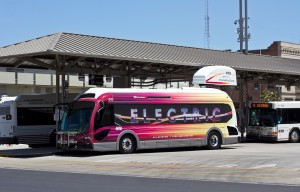Charges in Ten Minutes

electric bus at a charging station. Photo by SanJoaquinRTD
By George Harvey
While a lot of attention has been given to Teslas and Nissan Leafs, we should really look at electric busses. One company in particular, Proterra, is making a lot of progress with such vehicles.
Proterra is not just building electric buses. They are setting records. Earlier this year, Proterra had an electric bus go 700 miles in one 24-hour period, and they believe this is a record. It did stop for recharging along the way, but the bus recharges in about 10 minutes, an amount of time a bus might typically stand idle at a terminal while the driver takes a break. And, the air conditioning was on for the test.
There is more to be said about the Proterra, however. For one thing, it can compete successfully with buses powered by diesel and compressed natural gas (CNG). The initial cost of the Proterra is a bit high, compared to conventionally powered buses, but this is more than made up for by reduced maintenance and fuel costs.
The Proterra has a much simpler drivetrain than is required by either diesel-powered or CNG-powered buses. Motors are far simpler than internal combustion engines, and getting power from the motor to the wheels requires a much simpler mechanical system than a typical transmission. Because maintenance is simpler, its cost over the life of the vehicle is far lower.
The cost of electricity to drive a mile is very low, compared to the cost of CNG or diesel fuel. Proterra says the cost of fuel to drive a diesel bus a mile is about $1.03. By choosing the more complex hybrid technology, this can be cut to $0.76. A bus running on CNG costs about $0.71 pre mile to run. By contrast, the Proterra costs about $0.19 per mile.
Overall, the lifetime cost of a Proterra bus is $365,000 less than that of a diesel bus, and $225,000 less than that of one powered by CNG. These figures do not take into account the difference in costs of pollution, and those are far lower for electric vehicles than for those powered by fossil fuels.
Another problem with conventionally-powered buses is that they are noisy. On the other hand, the Proterra is not. And since noise is a serious problem in urban environments where buses are used a lot, the issue is important.
Proterra has been making buses since 2004, but in the short time of ten years the company has established a broad customer base, mostly in the South and on the West Coast. Six buses have been put on the road in Worcester, Massachusetts, however, and these seem to be doing well, despite the winter weather. We might think they could do well in Vermont and New Hampshire.








Leave a Reply